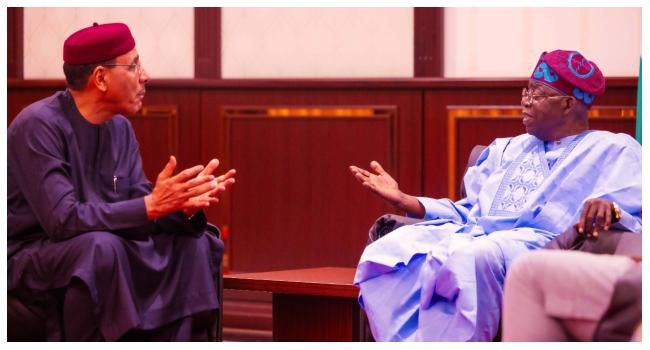What the Nigerian Constitution says about possible military intervention in Niger
![Men of the Nigerian Army. [Nigeria Info]](https://image.api.sportal365.com/process/smp-images-production/pulse.ng/26072024/dfe6fbe6-10ac-4522-a6ad-9487fc22abdc?operations=autocrop(700:467))
The initial threat by the Economic Community of West African States (ECOWAS) to reverse the coup in the Republic of Niger with military intervention has been a great deal of concern for Nigerians.
The ECOWAS is headed by Nigeria’s President, Bola Ahmed Tinubu and as the biggest economy in Africa, Nigeria is expected to play a leading role in resolving the political crisis in Niger.
Aside from being an economic powerhouse, Nigeria is one of the four West African countries that share borders with Niger. Two of the four countries — Mali and Burkina Faso — are Niger allies.
Following the military takeover in Niger, the ECOWAS issued a seven-day ultimatum to the junta to reinstate President Mohamed Bazoum or risk military intervention.

In response to the threat, Mali and Burkina Faso in a joint statement warned Nigeria and ECOWAS that any attempt to intervene militarily could result in “disastrous consequences” that “could destabilise the entire region.”
Niger has called the bluff of the ECOWAS, but while diplomatic talks are ongoing, West African leaders have not taken the initial military intervention option off the table.
Interestingly, Niger depends on Nigeria for 70% of its power and as part of the sanctions imposed on the country by ECOWAS, Nigeria has disconnected its daily supply of 150 megawatts of electricity daily to the country.
Nigeria is ostensibly itching to impose more economic and financial sanctions to ensure the reinstatement of Bazoum and democracy in Niger.
But these moves, in the views of Nigeriens are indications that ECOWAS and President Tinubu will not hesitate to go to war to reinstate the ousted president.
What does the Constitution say?
While several prominent Nigerians have called on President Tinubu not to go to war with Niger, it’s important to understand what the Constitution of the Federal Republic of Nigeria says about the lingering issue.
Sections 4 and 5 of the Constitution state the conditions on which Nigerian soldiers can be deployed for war with another country.
![Men of the Nigerian Army. [Punch]](https://image.api.sportal365.com/process/smp-images-production/pulse.ng/26072024/a6f549c3-de52-48e3-9dbf-bc142b7f5163)
According to section 4 (a), “The President shall not declare a state of war between the Federation and another country except with the sanction of a resolution of both Houses of the National Assembly, sitting in a joint session.”
Section 4 (b) states that Nigerian soldiers will not engage in combat outside the country “Except with the prior approval of the Senate, no member of the armed forces of the Federation shall be deployed on combat duty outside Nigeria.”
However, section 5 of the Constitution proposes that members of the Nigerian armed forces can be deployed on a ‘limited combat’ outside the country if the security of the country is threatened.
The section reads, “Notwithstanding the provisions of subsection (4) of this section, the President, in consultation with the National Defence Council, may deploy members of the armed forces of the Federation on a limited combat duty outside Nigeria if he is satisfied that the national security is under imminent threat or danger.”
Now that the leader of the military junta in Niger has called the bluff of ECOWAS with Mali and Burkina Faso issuing a counter-threat to Nigeria and other West African countries, it remains to be seen if President Tinubu would unleash the ECOWAS and Nigerian troops on Niger to restore democracy in the country.
)
![Aisha blows hot on Security forces; Y7ou won't believe what she said [VIDEO]](https://image.api.sportal365.com/process/smp-images-production/pulse.ng/17082024/1f976edf-1ee2-4644-8ba1-7b52359e1a8f?operations=autocrop(640:427))
)
)
)
![Lagos state Governor, Babajide Sanwo-Olu visited the Infectious Disease Hospital in Yaba where the Coronavirus index patient is being managed. [Twitter/@jidesanwoolu]](https://image.api.sportal365.com/process/smp-images-production/pulse.ng/16082024/377b73a6-190e-4c77-b687-ca4cb1ee7489?operations=autocrop(236:157))
)
)
)
)
)
)
)
)
)
)
)